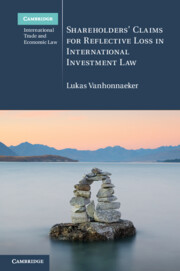Book contents
- Shareholders’ Claims for Reflective Loss in International Investment Law
- Cambridge International Trade and Economic Law
- Shareholders’ Claims for Reflective Loss in International Investment Law
- Copyright page
- Contents
- Figures
- Foreword
- Acknowledgments
- Table of Cases
- Table of Treaties
- Abbreviations and Acronyms
- Introduction: International Investment Law’s Narrative and Shareholders’ Claims for Reflective Loss
- 1 Shareholders in International Investment Law
- 2 International Investment Law’s Shareholders’ Claims for Reflective Loss: A Clash of Policies
- 3 Shareholders’ Claims for Reflective Loss in Domestic Regimes, Customary International Law of Diplomatic Protection, and Human Rights Law
- 4 International Investment Law on the Standing of Shareholders
- 5 Legal Uncertainty and Inconsistency Militating against Shareholders’ Claims for Reflective Loss: The Unpredictability of Investment Disputes Involving Shareholders
- 6 Shareholders’ Claims for Reflective Loss and the Dangers of Parallel Proceedings
- 7 International Res Judicata as a Solution to Parallel Proceedings Arising from Shareholders’ Claims for Reflective Loss in International Investment Law
- 8 The Consolidation of Proceedings and Mass Claims in International Investment Law and Arbitration
- 9 Calculating Damages in Shareholders’ Claims for Reflective Loss
- Conclusion
- Bibliography
- Index
8 - The Consolidation of Proceedings and Mass Claims in International Investment Law and Arbitration
Published online by Cambridge University Press: 13 July 2020
- Shareholders’ Claims for Reflective Loss in International Investment Law
- Cambridge International Trade and Economic Law
- Shareholders’ Claims for Reflective Loss in International Investment Law
- Copyright page
- Contents
- Figures
- Foreword
- Acknowledgments
- Table of Cases
- Table of Treaties
- Abbreviations and Acronyms
- Introduction: International Investment Law’s Narrative and Shareholders’ Claims for Reflective Loss
- 1 Shareholders in International Investment Law
- 2 International Investment Law’s Shareholders’ Claims for Reflective Loss: A Clash of Policies
- 3 Shareholders’ Claims for Reflective Loss in Domestic Regimes, Customary International Law of Diplomatic Protection, and Human Rights Law
- 4 International Investment Law on the Standing of Shareholders
- 5 Legal Uncertainty and Inconsistency Militating against Shareholders’ Claims for Reflective Loss: The Unpredictability of Investment Disputes Involving Shareholders
- 6 Shareholders’ Claims for Reflective Loss and the Dangers of Parallel Proceedings
- 7 International Res Judicata as a Solution to Parallel Proceedings Arising from Shareholders’ Claims for Reflective Loss in International Investment Law
- 8 The Consolidation of Proceedings and Mass Claims in International Investment Law and Arbitration
- 9 Calculating Damages in Shareholders’ Claims for Reflective Loss
- Conclusion
- Bibliography
- Index
Summary
This chapter addresses a second set of answers to parallel proceedings in the context of shareholders’ claims for reflective loss, the risks of double recovery, and the inconsistent decisions they lead to: a broader use of the mechanism of consolidation and mass claims in international investment arbitration. First, the mechanism of consolidation is analyzed in the context of investment arbitration by focusing on treaty practice and investment case law. This chapter explains why this mechanism can be useful to reduce instances of parallel proceedings and why it is particularly well suited in the context of such proceedings created by shareholders’ claims for reflective loss. The same analysis is undertaken with respect to the practice of mass claims in investment arbitration, and for similar reasons as with respect to consolidation, this chapter suggests a broader use of such multiparty proceedings in investment arbitration, especially with respect to shareholders’ claims for reflective loss.
- Type
- Chapter
- Information
- Publisher: Cambridge University PressPrint publication year: 2020

